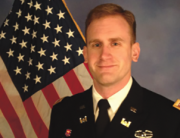You are on CGS' Legacy Site.
Thank you for visiting CGS! You are currently using CGS' legacy site, which is no longer supported. For up-to-date information, including publications purchasing and meeting information, please visit cgsnet.org.

Many graduate students learn the importance of experimentation to good research through coursework, mentorship, and controlled lab environments. Wayne Johnson, a doctoral student in management at Cornell University, took a completely different path. As the leader of an Army counter-bomb unit in Eastern Afghanistan, Johnson had seen how bomb defusal and removal strategies designed for troops serving in Iraq were failing in Afghanistan. “After a month of heavy losses, I realized radical experimentation was needed,” he said. Johnson found that the new methods worked well and he was reassigned to the Army Research lab to teach what he had learned to others.
Johnson’s improvised counter-bomb strategy and time at the Army research lab taught him that “research was a powerful microphone to project voice and knowledge far beyond my reach as a tactics instructor.” As his interests shifted into the field of organizational behavior, Johnson wondered if he import the lessons he learned from his military service to other organizations. He thought the best path for achieving this goal would be to complete a Ph.D. in management at Cornell University’s Johnson School of Business.
The transition was not easy. The writing requirements were more than Johnson expected and he felt that he was behind his peers who had already spent years studying organizational management at the undergraduate level. “I chose subjects for which I did not have deep experience or knowledge,” he noted, “so that naturally led to a steeper learning curve.”
One area that Johnson found did translate to graduate school was leadership. He had seen both successful and unsuccessful leaders in the Army and found that successful leaders were constantly engaged with their associates instead of only engaging when there was a problem or issue. “I learned that I should take time often to go find someone who usually only hears complaints and tell them, hey, I don’t have any complaints because you’re doing such a great job.” He found once a peer or subordinate felt valued as a person they were more likely to listen to and accept criticism. “It’s true that people often don’t care how much you know until they know how much you care.”
Johnson’s care for others has animated much of his service since leaving the military. He volunteered for a suicide hotline for three years. His experience working for the hotline taught him “how deep a need people have to be validated and heard.” Listening to others has always been a core component of Johnson’s worldview and one that will serve him well in the classroom. To learn more about Wayne’s work, visit the Cornell University website.
Image Credit: Cornell University
The CGS GRADIMPACT project draws from member examples to tell the larger story of graduate education. Our goal is to demonstrate the importance of graduate education not only to degree holders, but also to the communities where we live and work. Do you have a great story to share about the impact of master’s or doctoral education? Visit our WEBSITE for more information.




